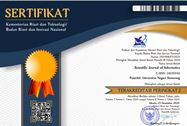Hybrid Water Feedback Solutions Using Internet of Thing (IoT) Enabled Water Pumps Powered by Solar Panels
(1) Department of Mathematic Education, University PGRI Semarang, Indonesia
(2) Department of Electrical Engineering, University PGRI Semarang, Indonesia
(3) Department of Mechanical Engineering, University PGRI Semarang, Indonesia
(4) Department of Computer Science and Elecrical Engineering, Kumamoto University, Japan
Abstract
Purpose: Renewable energy in Indonesia is very abundant, one of which is solar energy. With Indonesia's location on the equator, the abundant potential of solar energy can be utilized as an environmentally friendly source of electricity. To increase the potential of solar energy as a source of electricity, it is equipped with a battery storage system. The most widely used electrical energy storage system is the battery. The purpose of this study is the use of solar energy for DC water pumps. The proposed system is also equipped with power, voltage and current monitoring on the solar panel side and on the load side (water pump).
Methods/Study design/approach: The method used is to conduct a literature review to study and find out the development of a power monitoring system using solar panels. The next step is to measure solar radiation, calculate PV capacity and SCC. Furthermore, designing, modeling, simulating, analyzing, and implementing the optimal topology for water pump control using solar panels.
Result/Findings: The results of the research are water pump control coordination devices using Sonoff with an IoT-based monitoring system. This device is capable of controlling PV and battery power flow. A prototype of a solar water pump has been produced which has been validated by experts in the field of appropriate technology with feasible results and received a positive response from farmers in Demak to be immediately implemented in the fields to help with the water crisis in agricultural land
Novelty/Originality/Value: the advantage of this solar water pump is that the product is equipped with the internet of things (IoT) which can control the use of water pumps in the fields with our android devices wherever we are, this makes it easy for farmers to apply them, then the water pumps also do not use electricity which makes this water pump not harmful to farmers, because in the past many farmers were electrocuted and died.
Keywords
Full Text:
PDFReferences
G. A. B. Wirajati, D. M. C. Santosa, B. A. J. Pramana, P. G. S. Haryasa, I. A. G. B. Madrin, “Solar Power System Design Applications For Pool Water Pump Operation At Tourist Accomodation”, Journal of Engineering Design and Technology, Vol. 21 No. 3, 2021, pp. 159-164.
R. Kumar, B. Singh, “Grid Interactive Solar PV Based Water Pumping Using BLDC Motor Drive”, IEEE Transactions on Industry Applications, Vo.55, No.1, 2019, pp. 5153 – 5165.
M. A. Sastradiangga, I. A. D. Giriantari, W. Sukerayasa, “Solar PV Plant as a Replacement for Power Supply of Irrigation Water Pump”, International Journal of Engineering and Emerging Technology, Vol.5, No.2, 2020, pp.137-143.
E. E. A. Zahab, A. M. Zaki, M. M. El-sotouhy, “Design and control of a standalone PV water pumping system”, Journal of Electrical Systems and Information Technology, Vol.96, No.1, 2016, pp.1-14.
S. Angadi, U. R. Yaragatti, Y. Suresh, A. B. Raju,”Comprehensive Review on Solar, Wind and Hybrid Wind-PV Water Pumping Systems-An Electrical Engineering Perspective”, Transaction On Power Elektronics And Applications, Vol. 6, No. 1, 2021, pp.1-19.
C. Roselli, M. Sasso, F. Tariello, “Integration between electric heat pump and PV system to increase self-consumption of an office application, : Renew”, Energy Enviromental Sustainabillity, Vol.2, No.28, 2017, pp. 1-6.
R. J. Chilundo, U. S. Mahanjane, D. Neves, “Design and Performance of Photovoltaic Water Pumping Systems: Comprehensive Review towards a Renewable Strategy for Mozambique”, Journal of Power and Energy Engineering, Vol.6, No.1, 2018, pp.32-63.
R. Kumar, B. Singh, “BLDC Motor Driven Solar PV Array Fed Water Pumping System Employing Zeta Converter”, IEEE Transactions on Industry Applications , Vo. 52, No.3, 2016, pp. 2315 – 2322.
Rajan Kumar, Member, IEEE, and Bhim Singh, Fellow, IE, Single Stage Solar PV Fed Brushless DC Motor Driven Water Pump, IEEE Journal of Emerging and Selected Topics in Power Electronics, Vol. 5, No. 3, 2017, pp. 1377 – 1385.
S. Sashidhar, B. G. Fernandes, “A Novel Ferrite SMDS Spoke-Type BLDC Motor for PV Bore-Well Submersible Water Pumps”, IEEE Transactions On Industrial Eelectronics, Vol. 64, No. 1, 2017, pp.1-10.
A. Sen, B. Singh, “Peak Current Detection Starting Based Position Sensorless Control of BLDC Motor Drive for PV Array Fed Irrigation Pump”, IEEE Transactions On Industry Applications, Vol. 57, No. 3, 2021, pp. 2569-2577.
P. Santra, P.C. Pande, A.K. Singh, P. Kumar, “Solar PV pumping system for irrigation purpose and its economic comparison with grid- connected electricity and diesel operated pumps”, Indian Journal of Economics and Development, Vol 4, No. 4, 2016, pp. 1-7.
A. Kusmantoro, T. I. Wardani, S. Ristanto, “Soft Starter Induction Motor Three Phase With Fuzzy Logic Controller Inside Delta”, International Journal of Applied Engineering Research, Vol. 12, No. 19, 2018, pp. 8338-8345.
A. Keyhani, "Automatic Generation Control Structure for Smart Power Grids”, IEEE Transactions on Smart Grid, Vol.3 , No.3, 2012,
M. Makhlouf, F. Messal, H. Benalla," Modeling and Control of a Single-Phase Grid Connected Photovoltaic System", Journal of Theoretical and Applied Information Technology, Vol. 37 No. 2, 2012.
N. Agarwal and A. Kumar, “Optimization of grid independent hybrid PV–diesel–battery system for power generation in remote villages of Uttar Pradesh, India”, Energy for Sustainable Development, Vol. 17, No. 3, 2013.
A. D. Martin and J. R. Vazquez, “MPPT algorithms comparison in PV systems: P&O, PI, neuro-fuzzy and backstepping controls,” Proc. IEEE Int. Conf. Ind. Technol., pp. 2841–2847, 2015.
S. Kumar Kollimalla, M.K. Mishra, “Variable Perturbation Size Adaptive P&O MPPT Algorithm for Sudden Changes in Irradiance”, IEEE Transactions on Sustainable Energy, Vol. 5, No. 3, 2014.
Refbacks
- There are currently no refbacks.
Scientific Journal of Informatics (SJI)
p-ISSN 2407-7658 | e-ISSN 2460-0040
Published By Department of Computer Science Universitas Negeri Semarang
Website: https://journal.unnes.ac.id/nju/index.php/sji
Email: [email protected]
This work is licensed under a Creative Commons Attribution 4.0 International License.


